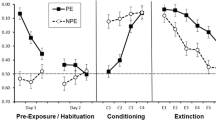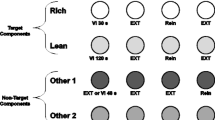Abstract
In a prior study (Gutman, Sutterer & Brush, 1975), 53 sessions of multiple variable-interval variable-interval (mult VI VI) baseline training produced weak positive contrast effects in the multiple extinction variable- interval (mult EXT VI) condition of Phase 2. Two rats from that study received additional training in the present study and showed stronger positive contrast effects in the mult EXT VI condition of Phase 4. In addition, two naive rats received 8 sessions of mult EXT VI in Phase 2 interpolated within 53 sessions of mult VI VI in Phases 1 and 3 and showed strong positive contrast effects in the mult EXT VI condition of Phase 4; the rats reproduced these effects in the mult EXT VI conditions of Phases 6, 8, and 10. Thus, extended baseline training seems to retard the subsequent positive contrast effect, but this retardation appears to be both reversible and preventable.
Similar content being viewed by others
References
GUTMAN, A. 1977. Positive contrast, negative induction and inhibitory stimulus control in the rat. Journal of the Experimental Analysis of Behavior, 27, 219–233.
GUTMAN, A., & MINOR, T. 1976. Local positive behavioral contrast in the rat. The Psychological Record, 26, 349–354.
GUTMAN, A., & SUTTERER, J. R. 1977. The effect of discrimination training on the response rate and response duration of the rat. Animal Learning and Behavior, 5, 247–252.
GUTMAN, A., Sutterer, J. R., & BRUSH, F. R. 1975. Positive and negative behavior contrast in the rat. Journal of the Experimental Analysis of Behavior, 23, 377–383.
HALLIDAY, M. S., & BOAKES, R. A. 1971. Behavioral contrast and response-independent reinforcement. Journal of the Experimental Analysis of Behavior, 16, 429–434.
HALLIDAY, M. S., & BOAKES, R. A. 1972. Discrimination learning involving response-independent reinforcement: Implications for behavioral contrast. In R.A. Boakes & M. S. Halliday (Eds.), Inhibition and learning. London: Academic Press.
MACKINTOSH, N.J. 1975. A theory of attention: Variability in the associability of stimuli with reinforcement. Psychological Review, 82, 276–298.
REYNOLDS, G. S. 1961. Behavioral contrast. Journal of the Experimental Analysis of Behavior, 4, 57–71.
WEISMAN, R. G. 1969. Some determinants of inhibitory stimulus control. Journal of the Experimental Analysis of Behavior, 12, 443–450.
WEISMAN, R. G. 1970. Factors influencing inhibitory stimulus control: Differential reinforcement of other behavior during discrimination training. Journal of the Experimental Analysis of Behavior, 14, 87–91.
WELKER, R. L., TOMIE, A., DAVITT, G. A., & THOMAS, D. R. 1974. Contextual stimulus control over operant responding in pigeons. Journal of Comparative and Physiological Psychology, 86, 549–562.
Author information
Authors and Affiliations
Additional information
This research was conducted at Syracuse University, and the manuscript was prepared at the University of Colorado. Preparation of the manuscript was supported by NIMH Postdoctoral Fellowship #NIH 5 F32 MH05061, awarded to the author. I would like to thank J. R. Sutterer, F. R. Brush and D. R. Thomas for their help at various stages.
Rights and permissions
About this article
Cite this article
Gutman, A. The Effect of Extended Baseline Training on Positive Behavioral Contrast: Reversible and Preventable Retardation. Psychol Rec 28, 399–404 (1978). https://doi.org/10.1007/BF03394552
Published:
Issue Date:
DOI: https://doi.org/10.1007/BF03394552




